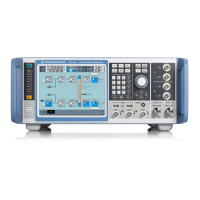Applying I/Q Vector Modulation
R&S
®
SMW200A
416User Manual 1175.6632.02 ─ 16
and output at the RF outputs. Which logical information, i.e. which stream, is output at
which connector is defined by the "IQ Stream Mapper".
For additional information, refer to Chapter 3.3, "Overview of the Input and Output Sig-
nals and Interfaces", on page 129 and Chapter 3.4.2, "I/Q Stream Mapper Settings",
on page 144.
Table 6-1: Physical input signals of the I/Q modulator
Input signal Input connector GUI parameter
Internal digital baseband signal - "I/Q Mod. > I/Q Mod. In > Internal Base-
band I/Q In" and "Baseband > On"
●
External analog wideband
●
External differential analog
(in the first signal path)
●
I/Q
●
I/Q BAR
●
"I/Q Mod. > I/Q Mod. In > Analog
Wideband I/Q In"
●
"I/Q Mod > I/Q Settings > Source >
Differential Analog I/Q Input"
External digital signal CODER "I/Q Mod. > I/Q Mod. In > Internal Base-
band I/Q In" and "BB Input > On"
Interdependencies
An I/Q modulation with an external analog signal cannot be used simultaneously in
the same signal path with the following:
●
AM, digital modulation, digital standards
●
Fading, noise
●
External digital baseband input signal, arbitrary waveform generation, and multi-
carrier CW.
6.3 I/Q Modulator Settings
1. To configure the input signal source of the I/Q modulator, select "I/Q Mod > I/Q
Mod In" and enable an internal baseband or an analog wideband input signal.
2. To access the dialog box for configuring the I/Q modulator settings, select "I/Q Mod
> I/Q Settings > I/Q Modulator".
I/Q Modulator Settings

